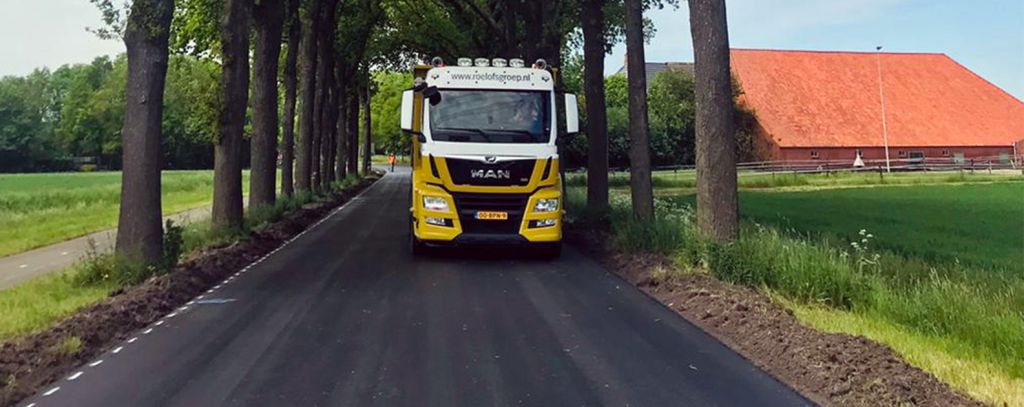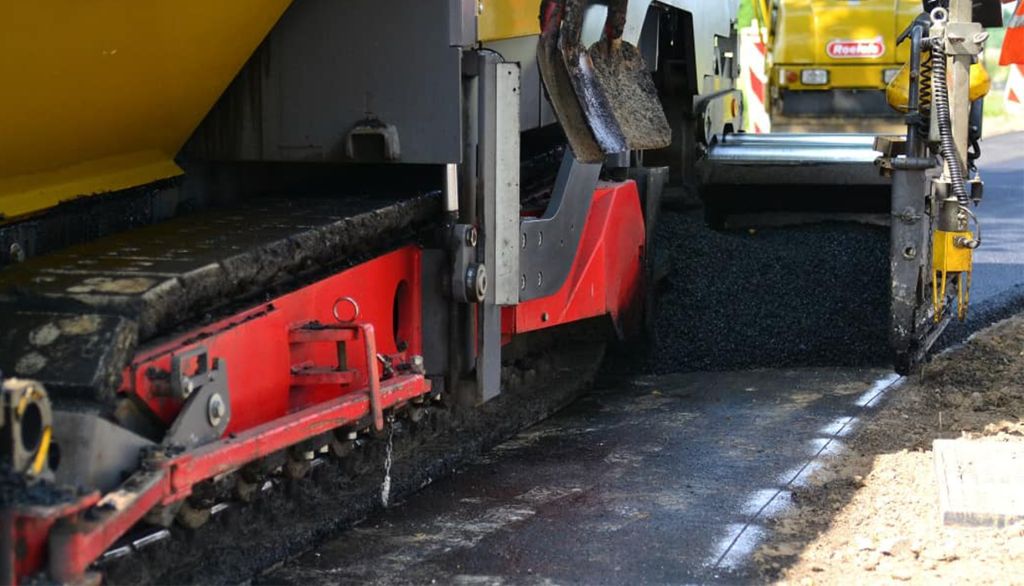TopDutch’s new bio-based road is leading to a fossil-free future
When we talk of making our roads fossil-fuel free, what would typically spring to mind are green mobility technologies such as EVs or hydrogen-powered trucks. But what about the – literal – roads? The asphalt-concrete that make up our roads are predominantly made of bitumen, derived from crude oil. This week in the TopDutch region, a major step was taken into reducing our global reliance on fossil fuels, as construction began on the world’s first test road that replaces bitumen with plant-based lignin produced in the Netherlands.

The TopDutch region is a pioneer in green mobility. Way back in 1835, scientists at the University of Groningen built the first ever electric car. After a century-and-a-half-long hiatus when we were unaware of the harms fossil fuels were doing to our planet, the region has again become a hub for sustainable technologies and ambitions. In a country aiming for 100% emission-free new passenger vehicles by 2030; our government is investing heavily in EV-charging and zero-emission public transport, our entrepreneurs are building sustainable applications, such as in Europe’s first dedicated hydrogen truck factory, and even our students are busy winning awards with their solar racecar.
But despite all these exciting and high-profile innovations on the road, most of us often don’t even consider the fossil fuels actually in the roads. The asphalt-concrete that lines our roads is predominantly made of bitumen, a derivative of crude oil. However, a crucial step towards fossil-free infrastructure was made in the TopDutch region this week, when Avantium and Roelofs began construction of the world’s first test road made from bio-asphalt with Dutch lignin in the province of Groningen. The 250-meter test road is part of the CHAPLIN XL* project, a collaboration of industrial and academic parties aiming to demonstrate that lignin as bitumen replacement works effectively at scale and leads to a significant CO2 reduction of road construction.

Changing the nature of chemistry
Avantium develops and commercializes innovative technologies for the production of plant-based chemicals and materials. From its DAWN pilot biorefinery in Delfzijl, in the TopDutch region, Avantium converts woody feedstock into industrial sugars and lignin. Lignin can be used for energy generation, but is also suitable for many higher value applications such as for bio-asphalt. In total, about 1,000 kg of Avantium lignin was added to the asphalt to replace a portion of the bitumen used in the production of the top layer of the test section on the N987. Annelie Jongerius, senior scientist at Avantium responsible for the valorisation of lignin, comments: "We are excited to showcase the potential of our lignin for the production of bio-asphalt. It is a great example of realising Avantium’s mission to replace fossil-based chemicals and materials with renewable alternatives."
We are excited to showcase the potential of our lignin for the production of bio-asphalt.
Annelie Jongerius, Senior Scientist at Avantium
The CHAPLIN XL project is a union of academic and industrial organizations including Avantium, Roelofs, Utrecht University, Wageningen Food & Biobased Research, Asfalt Kennis Centrum, H4A Infratechniek and Stichting Biobased Delta. Powered by an innovation grant from the Netherlands Enterprise Agency, the partners have improved the process in order to produce bio-asphalt in conventional asphalt plants. This makes it possible to scale-up the lignin-based asphalt technology.
Avantium closely collaborates with Roelofs, who has the ambition to transition to bio-asphalt. Roelofs will also construct a second test section on the N987 with conventional Kraft lignin from a Finnish paper mill. Gerard Hoiting, managing director at Roelofs, is pleased with the collaboration: "As a company we have the ambition to be climate neutral in 2030. Not only internally, but also with clients and partners we look for innovations and concrete applications and inspire each other towards a better world. This collaboration is a great example of this".

We look for innovations and concrete applications and inspire each other towards a better world.
Gerard Hoiting, Managing Director at Roelofs
The CHAPLIN XL partners will extensively analyse the lignin-based test road on performance, on techno-economic feasibility as well as on environmental benefits through a Life Cycle Assessment. Preliminary results indicate that lignin-based asphalt allows for a substantial reduction of the carbon footprint compared to its fossil-based counterpart. Martin Junginger, professor Biobased Economy at Utrecht University and project coordinator of CHAPLIN XL, comments: "For the wide application of lignin in road construction in the future, it is necessary for road constructors to be able to provide financial, technical and environmental validation of bio-asphalt in tenders. We also notice that there is high international interest from road constructors for our test results".
For the wide application of lignin in road construction in the future, it is necessary for road constructors to be able to provide financial, technical and environmental validation of bio-asphalt in tenders.
Martin Junginger, professor of Biobased Economy at Utrecht University
Perfect fit in the TopDutch region
IJzebrand Rijzebol, member of the Provincial Executive for Groningen, is pleased that the innovative test road is being built in the TopDutch region. The test road is being constructed on the N987, just down the road from Chemport Europe in Delfzijl, which is on track to be the first CO2 negative and fossil-free chemical cluster in the world. The bio-asphalt itself will also take place in the region, at at Asfalt Production Westerbroek (APW) in Westerbroek. He comments: "The northern region of the Netherlands has high ambitions to move away from fossil resources and to transition to a circular economy also based on regional available resources such as sugar and wood residues. The CHAPLIN XL partners share this ambition and the bio-asphalt test road therefore fits well with our goal".
The Northern Netherlands has high ambitions to move away from fossil resources and to transition to a circular economy
IJzebrand Rijzebol, member of the Provincial Executive for Groningen
Sign up to the newsfeed:
The TopDutch Professional newsfeed selects the most exclusive investment updates, industry insights and key stories. You’ll also receive unlimited access to articles and invites to exclusive international industry events and meet-ups.
"*" indicates required fields
